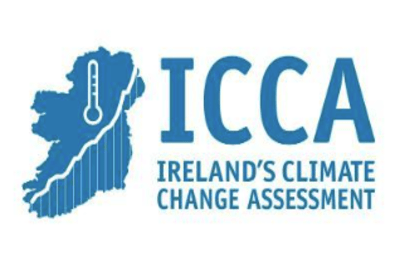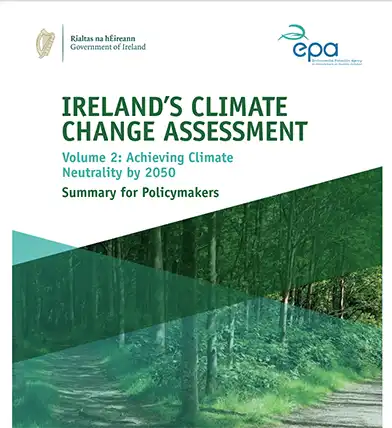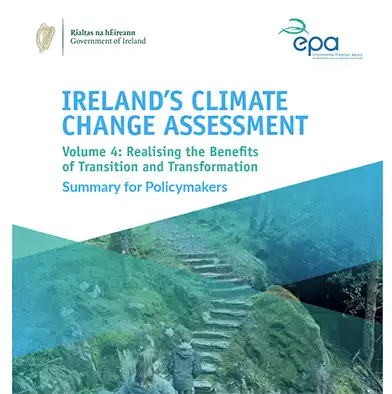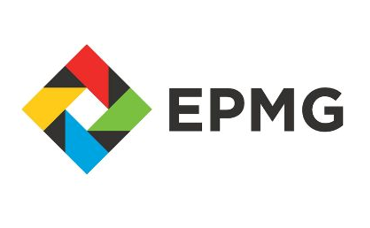ICCA
Ireland’s Climate Change Assessment Report Overview

Ireland’s Climate Change Assessment (ICCA) provides a comprehensive and authoritative assessment of the state of knowledge around all key aspects of climate change, with a central focus on Ireland. The objectives of the ICCA include delivering a comprehensive report on
- the current understanding of climate change
- the options to respond to the challenges that climate change poses
- identifying the opportunities that arise from the planned transition to a climate neutral, biodiversity-rich, environmentally sustainable and climate resilient economy and society
The report, in four volumes, including summaries for policymakers and a synthesis report can be found on the Environmental Protection Agency's website and are linked below.
- Ireland's Climate Change Assessment: Synthesis Report
- Ireland's Climate Change Assessment Volume 1: Climate Science—Ireland in a Changing World SPM Full volume
- Ireland's Climate Change Assessment Volume 2: Achieving Climate Neutrality by 2050 SPM Full volume
- Ireland's Climate Change Assessment Volume 3: Being Prepared for Ireland’s Future Climate SPM Full volume
- Ireland's Climate Change Assessment Volume 4: Realising the benefits if transition and transformation SPM Full volume
Aims
The report provides an assessment of our understanding of climate change, tying together all available lines of evidence to provide actionable information. This is based on scientific research and systematic observations in Ireland, linked to EU and global analysis. ICCA aims to provide summary information that can inform decision-making on climate actions.
The ICCA report is provided in four volumes. Each volume includes a short Summary for Policymakers. Accompanying the four volumes is a Synthesis Report which integrates key findings across the underlying volumes and provides an accessible overall summary.
MaREI Researchers Contribution to the ICCA Report
MaREI researchers at University College Cork were involved in writing Volume 2: Achieving climate neutrality by 2050 and Volume 4: Realising the benefits of transition and transformation of the assessment report.
Volume 2 – Achieving climate neutrality by 2050

Volume 2 aims to address achieving climate neutrality by 2050 by investigating and assessing three key areas: mitigation pathways, and what form reducing emissions over time may take; assessing the factors that may constitute and result in a climate neutral society, including energy use, land use and the emissions landscape; and finally, assessing the enablers that may make change possible by building on societal dimensions and investigating policy implications.
Authors include MaREI’s Prof Brian Ó Gallachóir, Dr Paul Deane, MaREI alumni Dr Connor McGookin and Dr Shane McDonagh, and Dr Abhay Menon.
Volume 4 – Realising the benefits of transition and transformation

Volume 4 highlights the benefits, opportunities and synergies that can be achieved through transformation, and how they can be realised. This volume is a state-of-the-knowledge assessment that draws on global synthesis literature, including the IPCC and the Intergovernmental Science-Policy Platform on Biodiversity and Ecosystem Services (IPBES), international peer-reviewed and grey literature to identify key characteristics of transformative change. It explores the emergence of these characteristics in the national context. Knowledge gaps are highlighted to inform and enhance research related to transformations in Ireland. This volume aims to aid national policy discussions toward enabling, catalysing and achieving transformative change and associated benefits.
Lead authors include MaREI’s Dr Roisin Moriarty and Prof Hannah Daly.
Related material
Administration Special Issue
The report authors were invited to make a contribution, based on Volume 4 of Ireland's Climate Change Assessment, to a special issue of Administration - Changing the Conversation about Climate Change - which will be edited by Professor Mary Murphy, Maynooth University.
This special issue aims to contribute to thinking about Ireland’s journey to being a sustainable state. It does this by contributing to and changing the conversation to a transformative agenda about climate and inequality. It aims to amplify and draw attention to the social science contribution to climate change. The special issue will focusing on the cojoined relationship between climate and inequality which underscores the need for transformative and systemic change.
Torney D, Daly H and Moriarty R. In preparation. A transformational approach to climate action in Ireland. Administration
Royal Irish Academy Reflects on Ireland's Climate Change Assessment
On the 15 November 2024 the Royal Irish Academy (RIA) launched a new blog series - Reflections on Ireland's Climate Change Assessment. The collection is a series of reflections from the RIA's Climate Change and Environmental Sciences Committee.
- Volume 1 - Professor Brian Caulfield reflects on the first volume of Irish Ireland’s Climate Change Assessment with additional responses from Dr Karen Bacon and Professor Laurence Gill.
- Volume 2 - Dr Olga Grant reflects on the second volume of Ireland’s Climate Change Assessment with additional response from Professor Michael Burton.
- Volume 3 - Dr Patrick Fournet reflects on the third volume of Ireland’s Climate Change Assessment with additional responses from Dr Peter Croot and Professor Fiona Regan.
- Volume 4 - Professor Patrick Brereton reflects on the fourth volume of Ireland’s Climate Change Assessment with additional responses from Professor Pilar Fernandez-Ibanez and Dr Kirstin Lemon.


